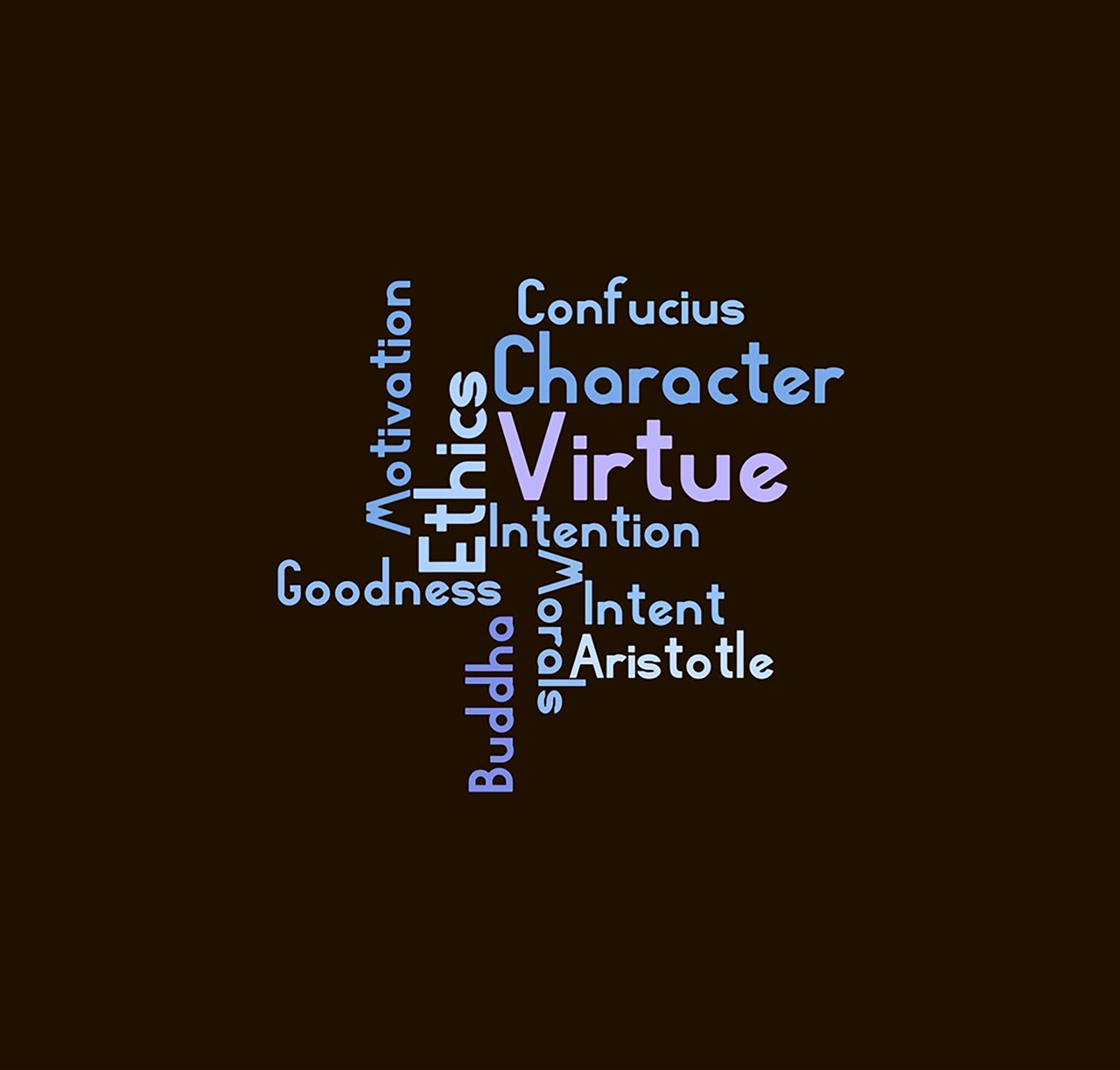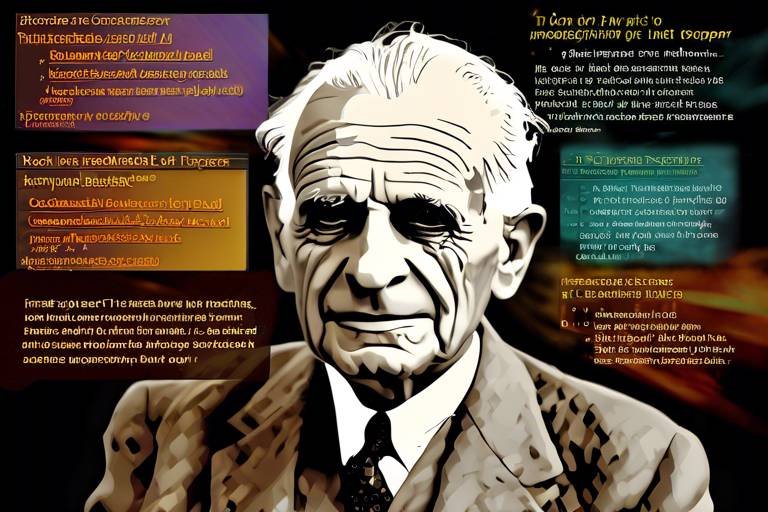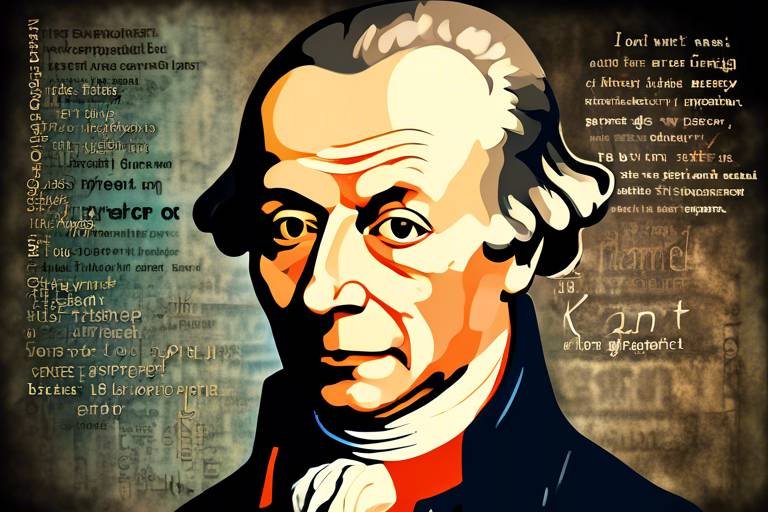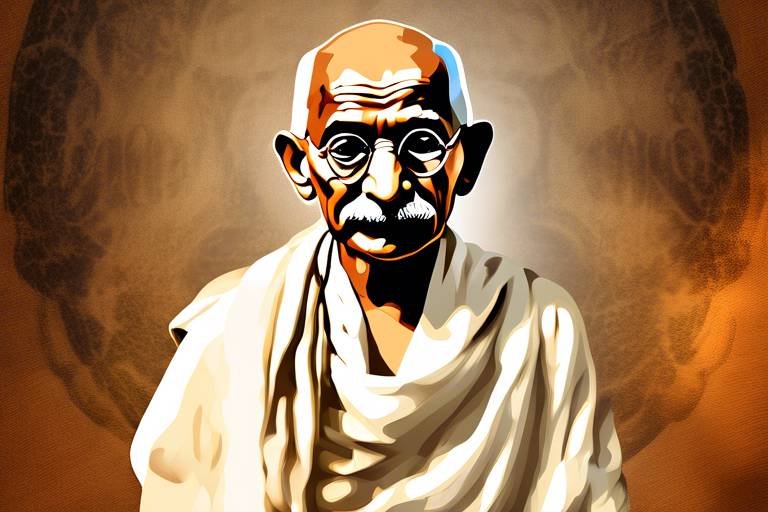Breaking Down Deontological Ethics as per Immanuel Kant
Deontological ethics, a term that might sound a bit intimidating at first, is all about the principles of duty and rules rather than the consequences of actions. Imagine you're standing at a crossroads, and you have two paths to choose from: one leads to immediate gratification while the other demands a sacrifice for a greater good. Deontological ethics, particularly as proposed by the renowned philosopher Immanuel Kant, urges us to consider our moral obligations before anything else. In this article, we’ll break down the core tenets of Kantian ethics, exploring how it sets itself apart from consequentialist theories—those that focus primarily on the outcomes of actions.
At the heart of Kant's philosophy is the idea that morality is grounded in rationality and universal principles. He believed that ethical actions are those that can be universally applied, meaning that if something is right for one person, it must be right for everyone in similar circumstances. This perspective offers a refreshing take on morality; it’s not about what you can gain but rather about what you ought to do. So, buckle up as we dive into the fundamental principles of deontological ethics, unraveling the intricacies of duty, moral responsibility, and the significance of adhering to moral laws.
One of the most compelling aspects of Kantian ethics is its unwavering stance on the importance of intention. Kant argued that the morality of an action is determined by the agent's intention rather than the outcome of the action. This is a game-changer because it shifts the focus from results to the underlying motives. For instance, if someone donates to charity with the intention of helping others, that act is considered morally good, regardless of whether the charity is effective or not. This emphasis on goodwill fosters a sense of moral integrity and encourages individuals to act from a place of duty, rather than self-interest.
However, navigating the landscape of moral obligations is not always straightforward. Conflicts of duty can arise, leaving individuals grappling with tough choices. For example, what happens when you have a duty to tell the truth but also a duty to protect someone's feelings? Kantian ethics provides a framework for resolving these dilemmas, emphasizing the need to prioritize duties based on their moral weight. This nuanced approach acknowledges that while duties are paramount, they can sometimes clash, requiring careful consideration and ethical reasoning to find a resolution.
In the following sections, we will explore Kant's Categorical Imperative, a cornerstone of his ethical framework that serves as a guide for determining moral actions. We’ll also delve into the implications of Kantian ethics in various fields, including law and medicine, illustrating its relevance and enduring influence in today's complex moral landscape.
- What is deontological ethics? Deontological ethics is a moral philosophy that emphasizes duties and rules over the consequences of actions.
- Who is Immanuel Kant? Immanuel Kant was an 18th-century philosopher known for his work in ethics, particularly the development of deontological ethics.
- What is the Categorical Imperative? The Categorical Imperative is a central concept in Kant's ethics, serving as a universal moral law that guides moral actions.
- How does Kantian ethics apply to modern dilemmas? Kantian ethics provides a framework for evaluating moral dilemmas by focusing on duties and intentions, making it applicable in various fields like law and medicine.

Fundamentals of Deontological Ethics
Deontological ethics, a term that may sound complex, is fundamentally about duty and rules. Unlike consequentialist theories, which focus on the outcomes of actions, deontological ethics emphasizes that certain actions are inherently right or wrong regardless of their consequences. Imagine a world where every action is judged solely by its results; it would be chaotic, right? Instead, Kantian ethics provides a structured approach to morality, establishing that our moral obligations are dictated by universal principles.
At its core, deontological ethics is grounded in the belief that individuals have a moral duty to adhere to rules. This perspective is largely shaped by the work of Immanuel Kant, who argued that moral actions must be guided by rationality and the inherent dignity of individuals. In this framework, the intentions behind actions are paramount. For Kant, an action is only morally good if it is done out of a sense of duty, not merely to achieve a favorable outcome. This leads us to ponder: if intentions matter more than results, how do we navigate the complex landscape of ethical decision-making?
Another key aspect of deontological ethics is its focus on universalizability. Kant posited that for a moral maxim to be valid, it must be applicable to everyone without contradiction. This means that before we act, we should ask ourselves, "What if everyone did this?" If the action can be universalized without leading to a contradiction, then it can be deemed morally acceptable. This principle serves as a powerful tool in our moral toolbox, guiding us toward decisions that respect the autonomy and dignity of all individuals.
However, the application of deontological ethics is not without its challenges. In real-life scenarios, individuals often face situations where their duties may conflict. For instance, consider a situation where telling the truth might harm someone. How does one navigate such moral dilemmas? This is where the richness of Kantian ethics comes into play, providing a framework for resolving these conflicts by prioritizing duties based on rationality and respect for persons.
In summary, the fundamentals of deontological ethics underscore the importance of duty, intention, and universal principles in guiding moral behavior. As we explore Kant's ideas further, we will uncover how these principles apply to everyday ethical dilemmas and the broader implications for society as a whole.
- What is deontological ethics? Deontological ethics is a moral philosophy that emphasizes the importance of duty and rules over the consequences of actions.
- Who is Immanuel Kant? Immanuel Kant was a German philosopher who developed the concept of deontological ethics and introduced the Categorical Imperative.
- What is the Categorical Imperative? The Categorical Imperative is a central principle in Kant's ethics that dictates that one should act according to maxims that can be universally applied.
- How does deontological ethics differ from consequentialism? While deontological ethics focuses on the morality of actions based on rules and duties, consequentialism evaluates actions based on their outcomes.

Kant's Categorical Imperative
The Categorical Imperative is the cornerstone of Immanuel Kant's ethical philosophy, serving as a guiding principle for moral action. Unlike hypothetical imperatives, which depend on personal desires or goals, the Categorical Imperative commands us to act according to maxims that can be universally applied. This means that our moral actions should not be contingent upon personal outcomes but should instead be rooted in a sense of duty and moral law. Kant believed that true morality arises from rationality and that our capacity to reason allows us to discern what our duties are, irrespective of the consequences.
One of the most significant aspects of the Categorical Imperative is its emphasis on the principle of universalizability. This principle requires that before we act, we should ask ourselves whether the maxim behind our action could be willed as a universal law applicable to everyone. For example, if one considers lying to get out of a difficult situation, the question arises: "What if everyone lied in similar situations?" If the answer leads to a contradiction or an untenable situation, then the action is deemed immoral. This rigorous approach helps to ensure that our actions are consistent and justifiable, promoting a sense of fairness and equality in moral considerations.
To further clarify how the Categorical Imperative operates, we can look at its formulations, which Kant articulates in different ways. Here’s a brief overview:
| Formulation | Description |
|---|---|
| Universal Law | Act only according to that maxim whereby you can, at the same time, will that it should become a universal law. |
| Humanity | Act in such a way that you treat humanity, whether in your own person or in the person of any other, always at the same time as an end and never merely as a means to an end. |
These formulations not only guide moral reasoning but also emphasize the inherent dignity of individuals. By adhering to these principles, we affirm the worth of every person, recognizing that they should never be treated merely as instruments for achieving our own goals. This respect for persons underpins Kant's ethical framework and highlights the importance of autonomy and moral agency.
Understanding the Categorical Imperative is crucial for practical moral decision-making. When faced with ethical dilemmas, individuals can utilize this framework to evaluate their choices. By applying the principle of universalizability, one can determine whether their actions align with moral law and respect for others. This method of ethical reasoning encourages individuals to think critically about their decisions and their implications for society as a whole.
However, it's important to note that while the Categorical Imperative offers a robust framework for ethical reasoning, it is not without its challenges. Critics argue that strict adherence to the Categorical Imperative can lead to rigid moral conclusions that may not account for the complexities of real-life situations. For instance, in cases where duties conflict, such as lying to protect someone's life, the application of the Categorical Imperative can become problematic. Kantian ethics encourages us to strive for moral clarity, but it also requires us to engage with the nuances of human experience.
In summary, Kant's Categorical Imperative serves as a vital tool for understanding and navigating moral dilemmas. By promoting universalizability and respect for persons, it lays a foundation for ethical behavior that transcends personal desires and societal norms. As we explore the implications of Kantian ethics further, we will see how these principles manifest in various aspects of life, from personal relationships to professional conduct.

Formulation of Universal Law
The formulation of universal law is one of the cornerstones of Immanuel Kant's deontological ethics. At its essence, this principle asserts that moral maxims must be applicable universally, meaning that they should hold true for everyone, everywhere, without exception. Imagine if everyone acted according to a particular rule; if that rule leads to a contradiction when applied universally, then it cannot be considered a valid moral law. This is where Kant's genius shines—he provides a framework that challenges us to think beyond our personal desires and consider the broader implications of our actions.
To better understand this concept, let’s break it down into a few key points:
- Universality: A moral action must be one that everyone can agree to follow without contradiction. If a rule cannot be universalized, it fails the test of moral validity.
- Consistency: The principles guiding our actions should remain consistent across all situations. If we allow exceptions for ourselves, we open the floodgates for moral chaos.
- Rationality: Kant believed that rational beings are capable of recognizing and adhering to universal laws. This rationality is what distinguishes humans from other beings and allows us to engage in moral reasoning.
When we apply the formulation of universal law to real-life scenarios, it serves as a litmus test for our moral decisions. For instance, consider the act of lying. If everyone lied whenever it suited them, trust would erode, and communication would break down, leading to societal dysfunction. Thus, the maxim "it is acceptable to lie" fails the universalization test, illustrating that lying cannot be a moral action.
Moreover, this formulation encourages us to reflect on our intentions. It’s not just about the act itself but the underlying principles that guide our choices. Are we acting out of self-interest, or are we considering the impact of our actions on others? Kant's approach compels us to elevate our moral reasoning by prioritizing duties that align with universal principles.
However, applying the formulation of universal law isn't always straightforward. Life is messy, and ethical dilemmas often present conflicting duties. For example, if telling the truth endangers someone's life, how do we reconcile that? Kantian ethics provides a robust framework for navigating these complexities, urging us to carefully evaluate our maxims before acting.
In summary, the formulation of universal law serves as a guiding principle in Kantian ethics, emphasizing that moral actions must be universally applicable and consistent. It challenges us to think critically about our moral obligations and the implications of our actions on a larger scale. By internalizing this principle, we can strive for a more ethical and just society, where our actions reflect a commitment to duty, rationality, and respect for all individuals.

Application in Moral Decision-Making
When it comes to making moral decisions, applying Kant's principles can feel like navigating through a dense forest—challenging yet enlightening. The essence of Kantian ethics lies in its emphasis on duty and adherence to moral laws rather than the consequences of our actions. This approach encourages individuals to consider their actions not just in terms of outcomes but in the context of their inherent moral value. Imagine you're faced with a dilemma: should you tell a friend a harsh truth that could hurt their feelings, or should you lie to spare them discomfort? Kantian ethics would guide you to prioritize honesty, as the act of lying cannot be universalized without contradiction.
To illustrate how Kant's principles can be practically applied in moral decision-making, let’s break down a typical scenario. Suppose a doctor is faced with the decision of whether to allocate limited resources to a patient in critical condition or to a patient with a better chance of survival. According to the formulation of universal law, the doctor must consider whether the maxim behind their action could be applied universally. If every doctor chose to save only those with the best prognosis, would that be a morally acceptable standard? This thought process forces the doctor to weigh their duties not only to individual patients but also to the broader ethical implications of their choices.
Moreover, Kant's principle of treating individuals as ends in themselves adds another layer of complexity. In our example, the doctor must respect the dignity and worth of each patient, making it essential to consider their moral obligations to both. This dual focus on duty and respect for persons encourages a more holistic approach to ethical dilemmas.
In practical terms, applying Kantian ethics can be broken down into several steps:
- Identify the action: What decision needs to be made?
- Formulate the maxim: What principle underlies this action?
- Universalize the maxim: Can this principle be applied to everyone without contradiction?
- Consider the implications: How does this action respect the dignity of all involved?
This structured approach not only clarifies the decision-making process but also reinforces the importance of moral integrity. By adhering to these steps, individuals can navigate complex ethical landscapes with confidence, ensuring that their choices align with both duty and respect for others.
Ultimately, the application of Kantian ethics in moral decision-making is not just about following rules; it’s about cultivating a deeper understanding of our responsibilities to ourselves and to others. By grounding our decisions in duty and respect, we can aspire to create a more ethical world—one choice at a time.

Limitations and Critiques
While Kant's deontological ethics has significantly shaped moral philosophy, it is not without its limitations and critiques. One major criticism is its rigidity; critics argue that Kantian ethics can be inflexible in its application. For instance, the strict adherence to duty and rules may lead to morally questionable outcomes in real-world situations. Imagine a scenario where telling a lie could save a life. According to Kant, lying is inherently wrong, regardless of the consequences. This unwavering commitment to duty can sometimes clash with our intuitive sense of morality.
Another critique revolves around the concept of universalizability. Kant's idea that moral maxims must be applicable to everyone without contradiction raises questions about the feasibility of creating universal laws. What happens when cultural differences and individual circumstances come into play? Critics argue that a one-size-fits-all approach fails to consider the complexities of human experience. For example, the moral implications of actions can vary significantly across different societies, making it challenging to establish universally accepted moral rules.
Moreover, Kantian ethics places a heavy emphasis on intentions over outcomes, which can lead to moral dilemmas. In some cases, the road to hell is paved with good intentions. This focus on goodwill can overlook the consequences of actions, which are often crucial in evaluating morality. A decision made with the best intentions can still result in harm, raising the question: should we not consider the outcomes at all?
Additionally, Kant's framework struggles with conflicts of duty. When two duties clash, Kantian ethics does not provide a clear resolution. For instance, if one has a duty to tell the truth but also a duty to protect a friend's confidentiality, Kant's system does not offer guidance on how to navigate such conflicts. This lack of practical solutions can leave individuals in ethical quandaries, questioning which duty to prioritize.
Lastly, some scholars argue that Kant's ethics can be overly abstract, making it challenging to apply in everyday life. The philosophical nature of Kantian ethics can alienate those looking for concrete guidance in moral decision-making. To bridge this gap, it is essential to contextualize Kant's theories within real-world scenarios, allowing individuals to see the relevance of his ideas in their daily lives.
In summary, while Kant's deontological ethics provides a robust framework for understanding morality, it is essential to recognize its limitations. The critiques surrounding rigidity, universalizability, the role of intentions, conflicts of duty, and abstractness highlight the need for a more nuanced approach to ethical decision-making. Acknowledging these limitations does not diminish Kant's contributions to moral philosophy but rather encourages a more comprehensive exploration of ethics in a complex world.
- What is deontological ethics? Deontological ethics is a moral philosophy that emphasizes duty and rules over the consequences of actions.
- Who developed deontological ethics? The most notable proponent of deontological ethics is the German philosopher Immanuel Kant.
- What is the Categorical Imperative? The Categorical Imperative is a central concept in Kant's ethics, serving as a universal moral law that dictates how individuals ought to act.
- What are the limitations of Kantian ethics? Limitations include rigidity, challenges in universalizability, an emphasis on intentions over outcomes, difficulties with conflicts of duty, and its abstract nature.
- How does Kantian ethics apply in real life? Kantian ethics can be applied in various fields, including law and medicine, but its abstract principles may require contextualization to address real-world dilemmas effectively.

Respect for Persons
Kant's ethical framework places a profound emphasis on the concept of , which is encapsulated in his second formulation of the Categorical Imperative. This principle asserts that individuals should always be treated as ends in themselves and never merely as means to an end. In simpler terms, this means recognizing the inherent dignity and autonomy of every person. Imagine a world where every interaction is grounded in this principle; relationships would flourish, and ethical considerations would take center stage in our daily lives.
At its core, respecting persons involves acknowledging their capacity for rational thought and moral agency. Kant believed that humans are unique in their ability to reason and make choices, which sets us apart from other beings. This idea leads us to understand that every individual has their own goals, desires, and rights that deserve recognition. When we engage with others, we must consider their perspectives, needs, and feelings, rather than viewing them solely as tools to achieve our objectives.
In practical terms, respecting persons translates into several key ethical guidelines:
- Informed Consent: In various fields such as medicine and research, respecting individuals means ensuring they are fully informed before making decisions that affect them.
- Equality: Every person deserves equal consideration and respect, regardless of their background, status, or beliefs.
- Empathy: Understanding and acknowledging the emotions and experiences of others fosters a more compassionate society.
Moreover, Kantian ethics challenges us to reflect on our actions and their implications for others. Are we acting in a way that respects the autonomy of others? Are we considering their well-being? These questions are essential in navigating the complexities of moral dilemmas. By adhering to the principle of respect for persons, we cultivate a moral landscape where individuals are valued and treated justly.
However, this respect is not merely a passive acknowledgment; it requires active engagement. For instance, in professional settings, leaders and colleagues must strive to create an environment where everyone feels valued and heard. This can be achieved through practices such as:
- Encouraging open communication and feedback
- Recognizing the contributions of all team members
- Providing opportunities for personal and professional growth
In conclusion, the principle of respect for persons is a cornerstone of Kantian ethics that has far-reaching implications for how we interact with one another. It calls us to honor the dignity and autonomy of every individual, fostering a more ethical and compassionate society. By integrating this respect into our daily lives, we not only adhere to Kant’s moral philosophy but also contribute to a world where everyone is valued and treated with the dignity they deserve.
1. What is the significance of respect for persons in Kantian ethics?
Respect for persons is crucial as it emphasizes treating individuals as ends in themselves, acknowledging their inherent dignity and autonomy.
2. How can I apply the principle of respect for persons in my daily life?
You can apply this principle by practicing empathy, ensuring informed consent in decisions that affect others, and treating everyone with fairness and equality.
3. Are there any limitations to the principle of respect for persons?
While the principle is fundamentally sound, it can face challenges in complex situations where conflicting duties arise, requiring careful consideration and balance.

Duty and Moral Responsibility
In the realm of ethics, especially within the framework of Kantian philosophy, the concepts of duty and moral responsibility hold significant weight. Kant believed that our actions should be governed by a sense of duty, which is inherently linked to our moral obligations. This perspective challenges us to consider not just the outcomes of our actions, but the intentions and principles that guide them. It raises a crucial question: are we acting rightly because we want to achieve a positive outcome, or is it because we recognize our duty to do what is morally correct?
Kantian ethics posits that moral actions stem from a sense of duty, which is dictated by rationality and the Categorical Imperative. This imperative serves as a guiding principle that compels individuals to act in accordance with universal moral laws. Essentially, Kant argues that we have a moral responsibility to uphold these laws, regardless of the situations we find ourselves in. In this way, duty becomes a cornerstone of ethical behavior, pushing us to act with integrity and respect for the moral law.
To further illustrate this, consider the following examples of duties that one might encounter in daily life:
- Honesty: Telling the truth, even when it may lead to personal disadvantage.
- Respect: Treating others with dignity and acknowledging their rights.
- Justice: Acting fairly and ensuring that one's actions do not harm others.
However, the path of duty is not always straightforward. Conflicts may arise where duties seem to clash, leading to moral dilemmas. For instance, what happens when telling the truth (a duty) could cause emotional harm to someone? Here, Kantian ethics encourages individuals to weigh their duties carefully, considering the implications of their actions while remaining steadfast in their commitment to moral principles. This approach reinforces the idea that our moral responsibilities are not just about personal feelings or societal norms; they are about adhering to a higher standard of ethical conduct.
In conclusion, the concepts of duty and moral responsibility in Kantian ethics compel us to look beyond immediate consequences and focus on the underlying principles that govern our actions. By embracing our duties, we not only uphold our moral integrity but also contribute to a more just and ethical society. As we navigate through life, let us remember that our intentions, guided by a deep sense of duty, shape the moral landscape around us.
Here are some common questions regarding duty and moral responsibility in Kantian ethics:
- What is the difference between duty and inclination?
Duty refers to the moral obligations we have, while inclination pertains to our personal desires or preferences. Kant emphasizes that moral actions should stem from duty rather than inclination.
- Can duties conflict in real-life situations?
Yes, conflicts of duty can arise. Kantian ethics encourages individuals to carefully consider the implications of their actions and strive for a resolution that adheres to moral principles.
- How does one determine their duties?
Determining one's duties involves reflection on universal moral laws and the principles outlined in Kant's Categorical Imperative, ensuring that actions can be universally applied.

The Role of Intentions
In the realm of deontological ethics, particularly in the context of Kantian philosophy, the significance of intentions cannot be overstated. Unlike consequentialist theories, which primarily evaluate the morality of actions based on their outcomes, Kantian ethics asserts that the moral worth of an action is rooted in the intentions behind it. This means that even if an action leads to a negative outcome, it can still be deemed morally right if it was performed with good intentions.
Kant believed that a truly moral action is one performed out of a sense of duty, guided by a commitment to moral law rather than personal gain or emotional inclination. This perspective invites us to consider the motive behind our actions. For instance, if a person donates to charity not just to help others but also to enhance their public image, the action, despite its positive outcome, lacks moral value in Kant's view. Hence, the intention behind the action is pivotal in assessing its ethical standing.
To illustrate this point, let's consider a few scenarios:
- Scenario 1: A doctor administers a treatment that has a low success rate but does so with the genuine intention of helping the patient. Despite the treatment's failure, the doctor's intention reflects a moral duty to care.
- Scenario 2: A businessperson implements eco-friendly practices but primarily to gain a competitive edge. Here, the intention is self-serving, which diminishes the ethical value of the action, despite its positive environmental impact.
- Scenario 3: A student helps a classmate study for an exam purely to foster a spirit of collaboration and support. The intention is altruistic, making the action morally commendable, regardless of the outcome of the exam.
These examples highlight that in Kantian ethics, the moral landscape is shaped significantly by the intentions behind our actions. This focus on intentions encourages individuals to cultivate a sense of duty and moral integrity, guiding them to act in accordance with universal moral laws.
However, it's essential to recognize that while intentions are crucial, they can sometimes lead to conflicts, especially when duties clash. For instance, if a person intends to tell the truth but doing so may harm another individual, the complexity of intentions becomes evident. Kantian ethics provides a framework for navigating such dilemmas, emphasizing the importance of adhering to moral principles even when faced with challenging situations.
In conclusion, the role of intentions in Kantian ethics is foundational. It serves as a reminder that our motives matter, urging us to engage in actions that reflect our commitment to moral duty. As we navigate the complexities of ethical decision-making, understanding and evaluating our intentions can provide clarity and guidance, ensuring that we remain aligned with our moral obligations.
- What is the main difference between deontological ethics and consequentialism?
Deontological ethics focuses on the morality of actions based on intentions and duties, while consequentialism evaluates actions based on their outcomes.
- How does Kantian ethics define a morally good action?
A morally good action is one performed out of duty and guided by the intention to adhere to moral laws, regardless of the consequences.
- Can an action be morally right if the outcome is negative?
Yes, according to Kantian ethics, if the action was performed with good intentions and a sense of duty, it can still be considered morally right.

Conflicts of Duty
In the realm of deontological ethics, the notion of duty is paramount, but what happens when those duties clash? Imagine standing at a crossroads where your obligations pull you in different directions—this is the essence of conflicts of duty. Kantian ethics, with its unwavering focus on moral rules, provides a framework for navigating these treacherous waters, but it’s not without its challenges. In this section, we will explore how Kant’s principles help us understand and resolve these conflicts, shedding light on the complexities of moral decision-making.
At the heart of Kant's philosophy lies the idea that our duties are derived from rational principles, which means that they are not merely subjective feelings or societal norms. Instead, they are grounded in a universal moral law that applies to all rational beings. However, life is rarely straightforward, and situations often arise where two or more duties seem to conflict. For instance, consider the scenario of a doctor who must decide between saving a patient’s life or respecting the patient’s autonomy when they refuse treatment. This is where Kant's ethical framework becomes particularly intriguing.
Kant argues that in such conflicts, we must carefully analyze the duties at play. To illustrate this, let’s break down the conflicting duties in our doctor scenario:
| Duty | Description |
|---|---|
| Duty to Save Life | The obligation to preserve life when possible, especially in a medical context. |
| Duty to Respect Autonomy | The obligation to honor a patient’s right to make their own decisions regarding their treatment. |
As we can see, both duties are compelling, yet they lead to a moral impasse. Kant’s approach suggests that the resolution lies in the prioritization of duties based on their moral weight. In this case, the duty to respect autonomy may take precedence because it acknowledges the inherent dignity and rationality of the individual. Kant believed that treating individuals as ends in themselves is crucial, and overriding a person’s autonomy could lead to treating them merely as a means to an end.
However, this prioritization isn’t always clear-cut. Conflicts of duty can be deeply personal and context-dependent, often requiring a nuanced understanding of the situation. For example, if the patient is unconscious and unable to express their wishes, the duty to save life may take precedence. This highlights the importance of context in ethical decision-making—a facet that Kant's framework can sometimes struggle to address adequately.
Ultimately, Kantian ethics encourages us to engage in a rigorous examination of our duties and the principles that underlie them. By doing so, we can aim to resolve conflicts through a thoughtful consideration of the moral implications of our choices. In a world where ethical dilemmas abound, the ability to navigate these conflicts is not just a philosophical exercise; it’s a vital skill that impacts our personal and professional lives.
- What is a conflict of duty in Kantian ethics?
A conflict of duty arises when two or more moral obligations clash, making it difficult to determine the right course of action. - How does Kant suggest resolving conflicts of duty?
Kant advocates for a careful analysis of the duties involved, often prioritizing duties based on their moral significance and the principle of treating individuals as ends in themselves. - Can conflicts of duty be resolved using a different ethical framework?
Yes, while Kantian ethics provides a structured approach, other ethical frameworks, such as consequentialism, may offer different perspectives on resolving conflicts.

Practical Applications of Kantian Ethics
When it comes to the real world, Kantian ethics isn't just a dusty old theory locked away in philosophy books; it's a living, breathing framework that influences various fields today. Imagine navigating through complex moral landscapes in law, medicine, and personal relationships—Kant's principles serve as a compass, guiding us toward ethical decision-making. But how does this all play out in practical terms? Let’s break it down.
In the realm of law, Kantian ethics has a profound impact. Legal systems often emphasize the importance of duty and rights, echoing Kant’s belief that individuals must be treated as ends in themselves. For example, consider how laws are designed to protect individual rights and ensure justice. Kant’s ideas challenge us to think critically about the implications of our laws. Are they just? Do they respect the dignity of every individual? By adhering to these principles, legal professionals can create a more equitable system that prioritizes moral responsibilities over mere consequences.
Moving into the field of medicine, the application of Kantian ethics becomes even more critical. Healthcare professionals face numerous ethical dilemmas daily, from issues related to patient consent to decisions about end-of-life care. Kant's emphasis on treating individuals with dignity and respect serves as a guiding light in these situations. For instance, when a doctor is faced with a decision about whether to disclose a terminal diagnosis, Kantian ethics would argue for transparency, as patients have the right to know the truth about their health. This respect for autonomy is foundational in ensuring that patients are treated not just as cases to be solved, but as individuals with their own rights and dignity.
Furthermore, Kantian ethics encourages healthcare providers to consider their intentions behind actions. It’s not enough to simply act in a way that produces good outcomes; the moral quality of the intentions behind those actions must also be scrutinized. This leads to a more profound level of ethical reflection, pushing professionals to ask themselves, “Am I acting out of goodwill?” or “Am I fulfilling my duty to my patients?”
Moreover, Kantian ethics also finds its way into personal ethics. In our everyday lives, we are constantly faced with choices that test our moral compass. Whether it’s deciding how to treat a friend or how to approach a business deal, Kant’s principles urge us to think about our duties to others. Are we being fair? Are we treating others as we would want to be treated? By applying Kantian ethics, individuals can cultivate a sense of moral responsibility that transcends personal gain and fosters a more just society.
To illustrate these applications further, let's take a look at a simple table summarizing how Kantian ethics applies across different fields:
| Field | Application of Kantian Ethics |
|---|---|
| Law | Emphasis on individual rights and justice; laws should respect human dignity. |
| Medicine | Focus on patient autonomy and informed consent; intentions matter. |
| Personal Ethics | Encourages fairness and respect in personal interactions; duty to treat others well. |
In conclusion, Kantian ethics is not just theoretical; it has practical implications that resonate deeply in our lives. By embracing these principles, we can strive to create a world where our actions are guided by duty, respect, and a commitment to treating every individual with the dignity they deserve.
- What is Kantian ethics? Kantian ethics is a deontological ethical theory developed by Immanuel Kant that emphasizes duty, rules, and moral obligations over the consequences of actions.
- How does Kant's Categorical Imperative guide moral decision-making? The Categorical Imperative serves as a universal principle that requires individuals to act according to maxims that can be universally applied without contradiction.
- Why is intention important in Kantian ethics? In Kantian ethics, the moral worth of an action is determined by the intention behind it, rather than the outcome it produces.
- Can Kantian ethics address conflicts of duty? While conflicts of duty can be challenging, Kantian ethics provides a framework for resolving these dilemmas by prioritizing duties based on rationality and moral law.
- Where can I see Kantian ethics applied in real life? Kantian ethics is applied in various fields, including law, medicine, and personal ethics, influencing how individuals and professionals make moral decisions.

Kantian Ethics in Law
Kantian ethics has had a profound impact on the development of legal systems around the world. At its core, Kant's ethical framework emphasizes the importance of duty and moral principles, which resonate deeply within the structure of law. The legal system is not merely a set of rules, but a reflection of our moral obligations to one another as members of society. In this way, the law serves as a mechanism through which we uphold our duties and ensure that justice is administered fairly and impartially.
One of the fundamental principles of Kantian ethics is the idea that laws must be universalizable. This means that when creating laws, lawmakers should consider whether the principles behind these laws could be applied universally without contradiction. For instance, if a law allows for a certain behavior, it must be justifiable as a principle that everyone could follow without leading to chaos or injustice. This aligns with the legal maxim that laws should be clear, consistent, and applicable to all individuals equally.
Furthermore, Kantian ethics stresses the intrinsic value of human beings, which is a crucial aspect of legal rights. Under Kant's view, individuals must be treated as ends in themselves, not merely as means to an end. This principle underpins many human rights laws, emphasizing that every person has inherent dignity and deserves respect. Legal systems influenced by Kantian ethics tend to prioritize the protection of individual rights, ensuring that laws do not violate personal autonomy or dignity.
In practice, the application of Kantian ethics in law can be illustrated through several key areas:
- Criminal Law: The legal system must operate on the premise that individuals are accountable for their actions, reflecting the Kantian belief in moral responsibility. Punishments should be proportionate and serve to uphold justice rather than simply deter crime.
- Contract Law: Agreements and contracts are built on the foundation of mutual respect and the duty to honor commitments. Kantian ethics reinforces the notion that contracts should be respected, as they are a reflection of the moral obligations between parties.
- Human Rights: Laws that protect human rights are deeply rooted in the Kantian principle of treating individuals as ends in themselves. This has led to the establishment of various international laws aimed at safeguarding individual freedoms and dignity.
Ultimately, the integration of Kantian ethics into the legal framework encourages a more just and equitable society. It compels lawmakers to consider the moral implications of their decisions and fosters a legal environment where the dignity of each individual is upheld. As we navigate complex legal issues, the principles of Kantian ethics remind us of the importance of duty, respect, and the pursuit of justice in our legal systems.
1. What is Kantian ethics?
Kantian ethics is a deontological ethical theory proposed by Immanuel Kant, which emphasizes the importance of duty and moral principles over the consequences of actions.
2. How does Kantian ethics influence law?
Kantian ethics influences law by promoting the idea that laws should be universalizable and that individuals must be treated as ends in themselves, which informs legal rights and responsibilities.
3. What is the Categorical Imperative?
The Categorical Imperative is a central concept in Kantian ethics that serves as a guide for determining moral actions based on principles that can be universally applied.
4. Can Kantian ethics address complex moral dilemmas?
While Kantian ethics provides a strong framework for moral decision-making, it has its limitations in addressing complex dilemmas, as it may not always offer clear solutions when duties conflict.
5. How does Kantian ethics relate to human rights?
Kantian ethics is closely related to human rights as it emphasizes the intrinsic value and dignity of individuals, forming the basis for many human rights laws and protections.

Implications in Medical Ethics
When we think about medical ethics, Kantian principles offer a profound framework that guides healthcare professionals in navigating the complex moral landscape of patient care. At the heart of Kant's deontological ethics is the idea that every individual deserves to be treated with respect and dignity. This means that in medical practice, healthcare providers are not just tasked with treating illnesses but also with upholding the rights and autonomy of their patients. Imagine a doctor who, despite having the knowledge to save a life, chooses to ignore a patient's wishes; this scenario starkly highlights the ethical dilemmas that arise when the principles of Kantian ethics are not applied.
Kant's emphasis on intentions over outcomes plays a crucial role in medical ethics. Healthcare professionals are often faced with difficult decisions where the outcomes are uncertain. For instance, consider a scenario where a physician must decide whether to disclose a terminal diagnosis to a patient. According to Kantian ethics, the intention behind the action—whether to respect the patient's autonomy or to spare them distress—must be carefully considered. The moral obligation to inform the patient aligns with the Kantian view that individuals should be treated as ends in themselves, deserving of full transparency and respect.
Moreover, Kant's notion of duty becomes particularly salient in situations involving informed consent. Patients have the right to make decisions about their own bodies and treatment options. A Kantian approach mandates that healthcare providers ensure patients are fully informed about their conditions and the risks associated with treatments. This respect for patient autonomy is not merely a legal obligation; it is a moral one. By fostering an environment where patients are empowered to make informed choices, healthcare professionals uphold the dignity of individuals, which is a cornerstone of Kantian ethics.
However, the application of Kantian ethics in medical practice is not without its challenges. Conflicts of duty can arise when a healthcare provider's obligations to different parties seem to clash. For example, a doctor may feel a duty to save a patient's life while also having a duty to respect the patient's wishes regarding end-of-life care. In such cases, Kantian ethics encourages practitioners to engage in ethical deliberation, weighing their duties carefully and seeking a resolution that honors the principles of respect and dignity.
In addition to individual patient care, Kantian ethics also has broader implications for healthcare systems and policies. For instance, when developing health policies, decision-makers must consider the ethical implications of their choices on vulnerable populations. A Kantian framework would advocate for policies that protect the rights and dignity of all individuals, ensuring equitable access to healthcare services. This approach not only fosters trust between patients and healthcare providers but also promotes a more just and humane healthcare system.
In summary, the implications of Kantian ethics in medical ethics are profound and far-reaching. By prioritizing respect for persons, informed consent, and the moral significance of intentions, healthcare professionals can navigate the complex ethical dilemmas they face. This framework not only enhances patient care but also reinforces the ethical foundations of the healthcare profession itself.
- What is the main principle of Kantian ethics in medical practice? Kantian ethics emphasizes the importance of treating individuals as ends in themselves, respecting their autonomy and dignity.
- How does informed consent relate to Kantian ethics? Informed consent is crucial as it ensures that patients are fully aware of their treatment options and can make autonomous decisions regarding their care.
- What are some challenges of applying Kantian ethics in healthcare? Conflicts of duty may arise when a healthcare provider's obligations to different parties clash, requiring careful ethical deliberation.
- How can Kantian ethics influence healthcare policy? Kantian ethics can guide policymakers to create equitable healthcare systems that protect the rights and dignity of all individuals.
Frequently Asked Questions
- What is deontological ethics?
Deontological ethics is a moral philosophy that emphasizes duties and rules over the consequences of actions. It focuses on the inherent rightness or wrongness of actions themselves, rather than the outcomes they produce. This approach is notably associated with the philosopher Immanuel Kant, who argued that moral obligations are based on rational principles.
- What is Kant's Categorical Imperative?
Kant's Categorical Imperative is a foundational concept in his ethical framework. It serves as a universal moral law that dictates how individuals should act. Essentially, it states that one should only act according to maxims that can be universally applied, meaning that if an action is deemed right for one person, it should be right for everyone in similar situations.
- How does the formulation of universal law work?
The formulation of universal law requires that any moral maxim you follow should be applicable to all rational beings without contradiction. For instance, if you believe it is acceptable to lie in certain situations, you must consider whether a world where everyone lies would be sustainable. If not, that maxim cannot be deemed morally acceptable.
- What are the limitations of Kantian ethics?
While Kantian ethics provides a strong framework for moral decision-making, it does have limitations. Critics argue that it can be too rigid, failing to consider the complexities of real-life situations. For example, in scenarios where duties conflict, such as telling the truth versus protecting someone from harm, Kant's framework may struggle to provide clear guidance.
- Why is respect for persons important in Kantian ethics?
Respect for persons is crucial in Kantian ethics because it emphasizes treating individuals as ends in themselves, rather than as means to an end. This principle highlights the importance of human dignity and autonomy, asserting that every person deserves to be valued and respected in moral considerations.
- How does Kantian ethics influence legal systems?
Kantian ethics significantly impacts legal systems by reinforcing the concepts of duty and rights. Legal frameworks often reflect the idea that individuals have inherent rights that must be respected and upheld. This ethical perspective informs judicial decisions and the creation of laws that promote justice and equality.
- What role does intention play in moral actions according to Kant?
In Kantian ethics, intentions are paramount. The morality of an action is judged based on the goodwill behind it, rather than its consequences. This means that even if an action leads to a negative outcome, if it was performed with good intentions, it may still be considered morally right.
- How can conflicts of duty be resolved in Kantian ethics?
Conflicts of duty can be challenging in Kantian ethics, as it often emphasizes strict adherence to moral rules. However, Kantian thinkers suggest that one must prioritize duties based on rational principles and the context of the situation. This requires careful consideration of the implications of each duty and how they align with moral law.
- What are some practical applications of Kantian ethics?
Kantian ethics has practical implications in various fields such as law, medicine, and personal ethics. In law, it informs the principles of justice and rights. In medical ethics, it guides healthcare professionals in making decisions that respect patient autonomy and consent. Its emphasis on duty and moral responsibility makes it a valuable framework for navigating ethical dilemmas.



















